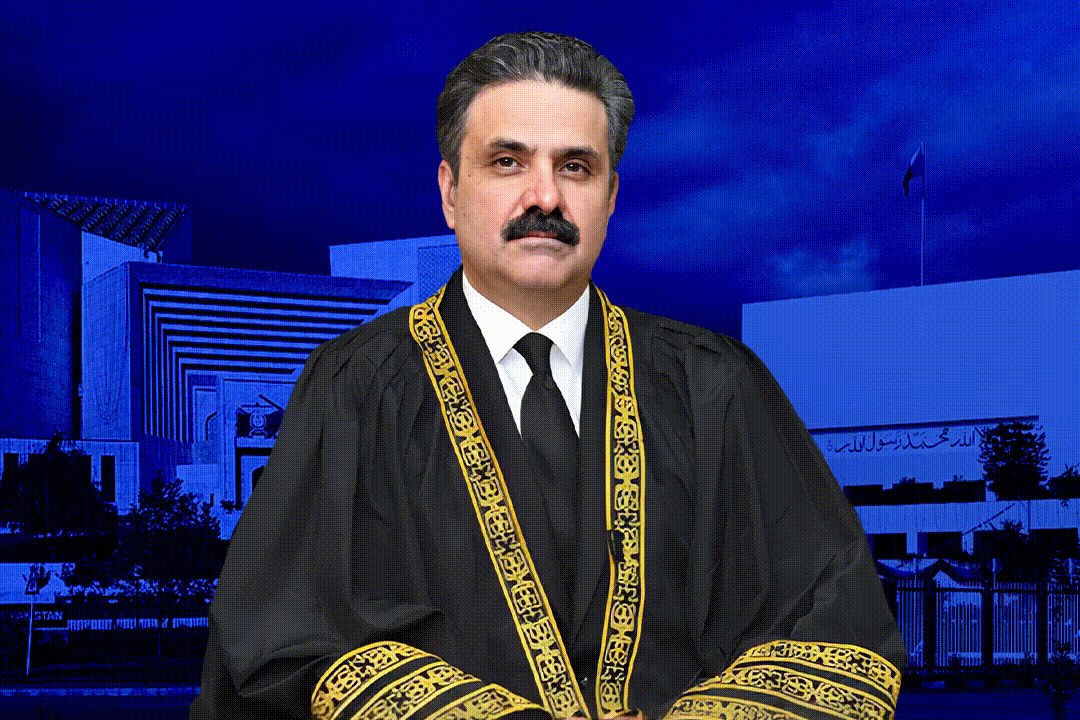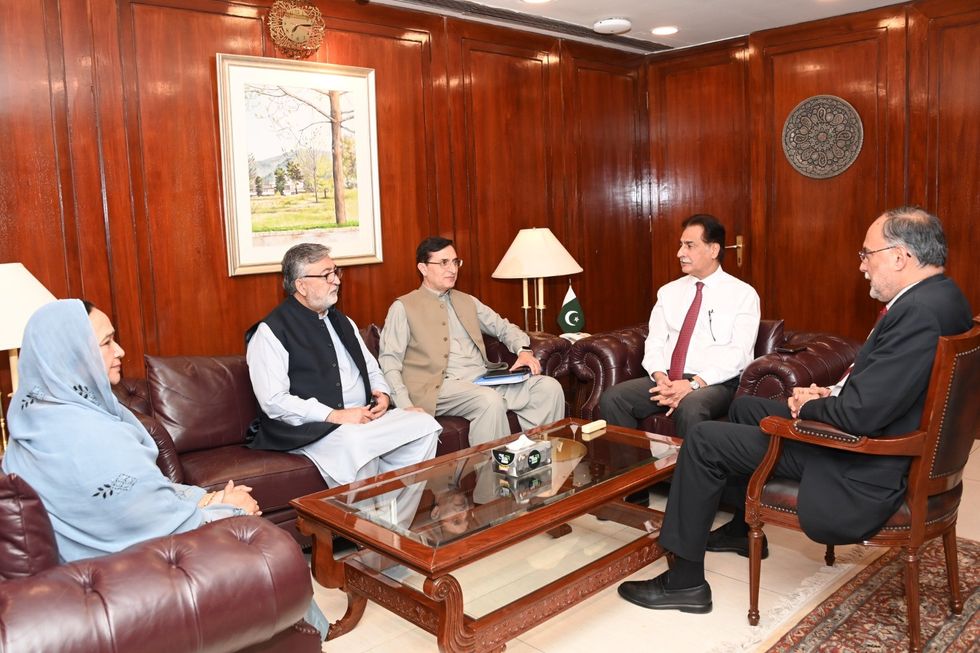Justice Yahya Afridi nominated by committee as next Chief Justice of Pakistan
Law minister says parliamentary committee's nomination approved with a two-thirds majority. Name shared with Prime Minister for formal endorsement.

Javed Hussain
Correspondent
I have almost 20 years of experience in print, radio, and TV media. I started my career with "Daily Jang" after which I got the opportunity to work in FM 103, Radio Pakistan, News One, Ab Tak News, Dawn News TV, Dunya News, 92 News and regional channels Rohi TV, Apna Channel and Sach TV where I worked and gained experience in different areas of all three mediums. My journey from reporting to news anchor in these organisations was excellent. Now, I am working as a correspondent with Nukta in Islamabad, where I get the opportunity of in-depth journalism and storytelling while I am now covering parliamentary affairs, politics, and technology.

Justice Yahya Afridi of the Supreme Court of Pakistan.
Nukta
First-ever Chief Justice selected by parliament under new constitutional reform
Committee chooses Justice Yahya Afridi despite opposition boycott
Afridi chosen over more senior judges, known for maintaining political neutrality
In a watershed moment, lawmakers convened on Tuesday to appoint the next Chief Justice of Pakistan, culminating in the selection of Justice Yahya Afridi for the position.
" With a two-thirds majority, which is the requirement in the Constitution, we [the Special Parliamentary Committee] have sent Justice Yahya Afridi's nomination to the Prime Minister," confirmed Law Minister Azam Nazeer Tarar.
- YouTube www.youtube.com
Justice Afridi's nomination marks the first-ever parliamentary committee CJP appointment under the 26th constitutional amendment.
After marathon sessions over the weekend in the National Assembly and Senate—the upper and lower houses of parliament—the 26th constitutional amendment was finally passed.
The 12-member committee, formed under the recently passed amendment, was tasked with selecting the next Chief Justice from among three senior Supreme Court judges: Mansoor Ali Shah, Munib Akhtar, and Yahya Afridi.
Parliamentary committee finalizes selection
The parliamentary committee initially adjourned its session to attempt reconciliation with opposition Pakistan Tehreek-e-Insaf (PTI)-affiliated Sunni Ittehad Council (SIC) lawmakers, who boycotted the process.
It reconvened at 9 p.m. without the opposition members' participation and proceeded to make its final decision.
Addressing the media during the adjournment, Tarar told reporters that Article 175 of the Constitution requires eight members — a two-thirds majority — to select the Chief Justice. He noted that while proceedings can continue without full participation, the committee seeks broader involvement.
- YouTube www.youtube.com
"[But] even if the Tehreek-e-Insaf members do not come, the committee will continue its work," Tarar clarified.
Earlier, committee members Raja Pervez Ashraf and Senator Farooq H. Naek emphasized that PTI's participation would strengthen the democratic process.
"Though we had the required numbers, we believe in democratic principles and want inclusive participation," Tarar said.
Committee-ception
Following the adjournment, Tarar announced the formation of a four-member reconciliation committee to convince PTI members to join the proceedings.
The committee included Pakistan Muslim League-Nawaz (PML-N)'s Ahsan Iqbal, Pakistan Peoples Party (PPP)'s Raja Pervez Ashraf, Jamiat Ulema Islam-Fazl (JUI-F)'s Kamran Murtaza, and Muttahida Qaumi Movement-Pakistan (MQM-P)'s Rana Ansar. They requested National Assembly Speaker Sardar Ayaz Sadiq's assistance in engaging PTI members.
“An attempt will be made to convince Tehreek-e-Insaf,” said Tarar.
Meeting with speaker
Sadiq arranged a meeting between the SIC members and the special committee members.
The PTI leaders met with National Assembly officials but declined to participate in the parliamentary committee meeting.

SIC informed National Assembly Speaker Ayaz Sadiq of their decision during the meeting in the speaker's chamber.
PTI Chairman Barrister Gohar Ali Khan, who attended the meeting in the speaker's chamber, said his party's political committee had decided against participating in the committee meetings.
Who is who in the parliamentary committee?
National Assembly Speaker Ayaz Sadiq wrote letters to leaders of political parties to suggest names for the 12-member parliamentary committee that will vote on the next chief justice.
So far, the ruling PML-N is represented on the committee by National Assembly members Khawaja Muhammad Asif, Ahsan Iqbal, Shaista Pervaiz Malik, and Senator Azam Nazeer Tarar.
The PPP, a government ally, is represented by National Assembly member and former Prime Minister Raja Pervaiz Ashraf and Senator Farooq H. Naek.
The MQM-P is represented by National Assembly member Rana Ansar.
The committee also includes independent PTI-affiliated candidates Barrister Gohar Ali Khan and Senator Syed Ali Zafar, as well as Sunni Ittehad Council's Sahibzada Hamid Raza.
JUI-F is represented by Senator Kamran Murtaza.
The parliamentary committee, comprising representatives from political parties, faces a tight deadline as the tenure of the incumbent CJP Isa ends this week. However, a new name must be submitted by the end of the meeting today.
PTI leaders distance themselves
Despite representation in the committee, the opposition PTI, whose founder ex-prime minister Imran Khan is in jail, has decided not to join the committee. The party has strongly objected to the constitutional amendments under which the process to appoint the chief justice has been changed.
The PTI has announced it will cancel the party membership of lawmakers who voted for the amendment against party policy.
PTI had earlier accused the government of abducting 11 lawmakers to force a yes vote from them.
On the day of the vote, three PTI-backed members were escorted into the National Assembly under tight security, while three others were stationed in the government gallery as “backups”.
Constitutional bench rubber stamp for government?
With the new amendment, all major cases of the higher judiciary will be transferred to a constitutional bench. This bench will be presided over by a judge other than the chief justice. The judicial commission, which includes government representatives and judges, will decide the composition of the bench.
Critics have argued that the latest changes will introduce a parallel justice system in the country, where the judicial commission will be reduced to a rubber stamp for the government.







Comments
See what people are discussing